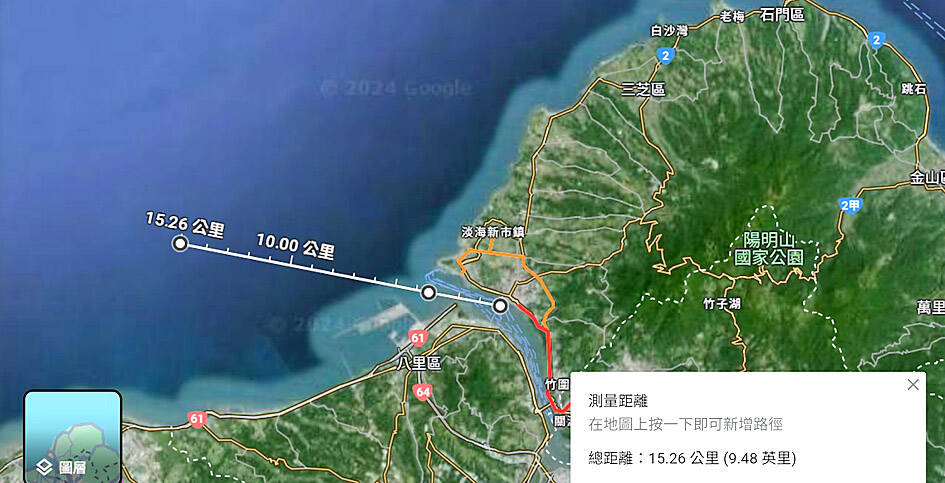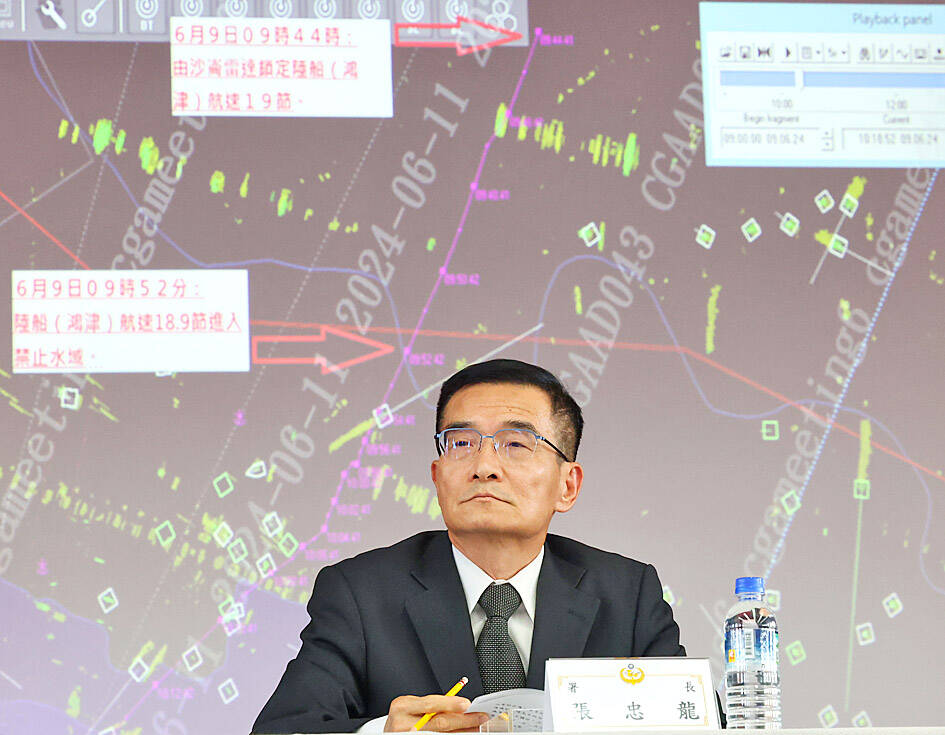Taiwan has stepped up national security measures, Premier Cho Jung-tai (卓榮泰) said yesterday, after a former Chinese navy captain was arrested for illegally entering the nation on a motorboat.
“National security cannot be neglected for a minute,” he said, adding that security units had been instructed to “immediately strengthen protective measures.”
Coast guard personnel arrested the man, surnamed Ruan (阮), on Sunday after his boat collided with other vessels at a ferry terminal on the Tamsui River (淡水河) in the north. Before that, he reportedly sailed the vessel into a harbor near the mouth of the river.

Illustration: Wu Jen-chieh, Taipei Times
Ruan is a retired member of the Chinese People’s Liberation Army Navy who had served as a captain, Ocean Affairs Council Minister Kuan Bi-ling (管碧玲) said yesterday.
Ruan was reported to have said he wanted to defect to Taiwan after having made anti-Chinese government comments on messaging apps.
However, Ruan looks different from previous “defectors” from China, Kuan said.

Photo: CNA
“In the past, Chinese defectors looked like they were hastily recruited by the Chinese government to carry out the task. However, [Ruan] looks more polite and was dressed more decently,” she said, adding that national security officials would investigate.
“Judging by the 18 cases involving Chinese [attempting to enter Taiwan illegally] in the past year, we do not rule out that it is a test that Beijing is conducting, because they all said they came to Taiwan to pursue a life of freedom,” she said.
Minister of National Defense Wellington Koo (顧立雄) said he met with the Coast Guard Administration (CGA) yesterday, as the boat had been allowed to gain access to one of the nation’s harbors.
“The defense of Tamsui River estuary would be key when deploying troops during wartime. However, during peacetime the coast guard and military work together to protect our territorial waters. The coast guard uses its inter-shore radar system to regulate marine activities, and the military serves as backup,” Koo said.
Asked whether the incident was part of China’s “gray zone” tactics aimed at testing the limits of the government, Koo said the ministry has not ruled that out.
“We have already included gray zone warfare in our annual table-top exercises. We need to ascertain whether this incident is part of China’s persistent gray zone tactics and stay on high alert for such a possibility. We will also study how to handle the unauthorized entry of a single Chinese vessel,” he said.
The CGA yesterday told a news conference that coast guard personnel had made mistakes that enabled the Chinese motorboat to cruise all the way to the harbor.
“The radar system operator had locked on to the Chinese speedboat 6 nautical miles [11km] off the coast of Tamsui District (淡水), but they mistakenly thought the boat was a Taiwanese fishing vessel returning to harbor,” the CGA said.
“Even though the operator notified the second fishing port in Tamsui and the CGA security inspection station in New Taipei City’s Bali District (八里), they did not ask a coast guard patrol boat to inspect the Chinese boat,” it said.
“The security inspection station in Bali also failed to immediately notify patrolling coast guard personnel to search and stop the boat after it verified that the boat was not a Taiwanese fishing boat,” the CGA said, adding that the personnel at fault would be held accountable.
To prevent radar system operators making errors, the CGA said it is considering using the radar system in conjunction with an inter-shore intelligent monitoring system, which uses an infrared thermal imaging camera.
It said that it would gradually increase the use of drones to help it inspect vessels and encourage Taiwanese fishing boats to install an automatic identification system.
Coast guard personnel would be better trained to coordinate with the military, the CGA added.
Additional reporting by AFP

INVESTIGATION: The case is the latest instance of a DPP figure being implicated in an espionage network accused of allegedly leaking information to Chinese intelligence Democratic Progressive Party (DPP) member Ho Jen-chieh (何仁傑) was detained and held incommunicado yesterday on suspicion of spying for China during his tenure as assistant to then-minister of foreign affairs Joseph Wu (吳釗燮). The Taipei District Prosecutors’ Office said Ho was implicated during its investigation into alleged spying activities by former Presidential Office consultant Wu Shang-yu (吳尚雨). Prosecutors said there is reason to believe Ho breached the National Security Act (國家安全法) by leaking classified Ministry of Foreign Affairs information to Chinese intelligence. Following interrogation, prosecutors petitioned the Taipei District Court to detain Ho, citing concerns over potential collusion or tampering of evidence. The

‘FORM OF PROTEST’: The German Institute Taipei said it was ‘shocked’ to see Nazi symbolism used in connection with political aims as it condemned the incident Sung Chien-liang (宋建樑), who led efforts to recall Democratic Progressive Party (DPP) Legislator Lee Kun-cheng (李坤城), was released on bail of NT$80,000 yesterday amid an outcry over a Nazi armband he wore to questioning the night before. Sung arrived at the New Taipei City District Prosecutors’ Office for questioning in a recall petition forgery case on Tuesday night wearing a red armband bearing a swastika, carrying a copy of Adolf Hitler’s Mein Kampf and giving a Nazi salute. Sung left the building at 1:15am without the armband and apparently covering the book with a coat. This is a serious international scandal and Chinese

Seventy percent of middle and elementary schools now conduct English classes entirely in English, the Ministry of Education said, as it encourages schools nationwide to adopt this practice Minister of Education (MOE) Cheng Ying-yao (鄭英耀) is scheduled to present a report on the government’s bilingual education policy to the Legislative Yuan’s Education and Culture Committee today. The report would outline strategies aimed at expanding access to education, reducing regional disparities and improving talent cultivation. Implementation of bilingual education policies has varied across local governments, occasionally drawing public criticism. For example, some schools have required teachers of non-English subjects to pass English proficiency

TRADE: The premier pledged safeguards on ‘Made in Taiwan’ labeling, anti-dumping measures and stricter export controls to strengthen its position in trade talks Products labeled “made in Taiwan” must be genuinely made in Taiwan, Premier Cho Jung-tai (卓榮泰) said yesterday, vowing to enforce strict safeguards against “origin laundering” and initiate anti-dumping investigations to prevent China dumping its products in Taiwan. Cho made the remarks in a discussion session with representatives from industries in Kaohsiung. In response to the US government’s recent announcement of “reciprocal” tariffs on its trading partners, President William Lai (賴清德) and Cho last week began a series of consultations with industry leaders nationwide to gather feedback and address concerns. Taiwanese and US officials held a videoconference on Friday evening to discuss the